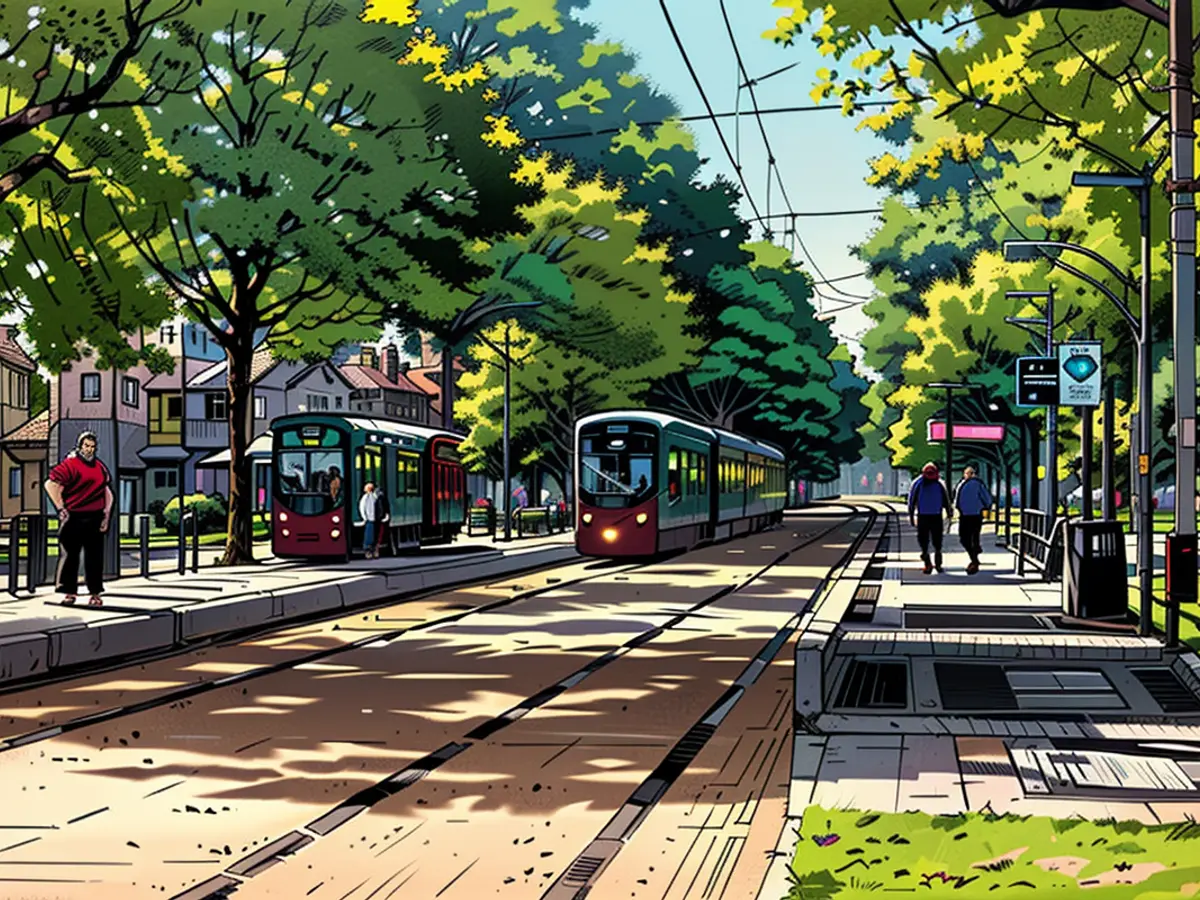Vehicle Movement - Cities anticipate mixed reactions as streetcar decision looms.
After people made choices about creating trams in two different towns in the Free State, authorities in Erlangen felt relief on Monday - while those in Regensburg were enraged. Individuals in Erlangen mostly (52.4%) supported the city-suburban tram, while the majority (53.6%) of folks in Regensburg voted against the tram. This voting happened after a week-long conversation that highlighted divisions in the city's social fabric. In Regensburg, this negative vote might even signal the end of the city hall alliance.
Both areas share one common aspect: In Middle Franconia and the Upper Palatinate, the local CSU had disagreed with the project before. In the case of Erlangen, they had prominent advocates of the project, like Mr. Markus Söder, the Minister President, and Mr. Joachim Herrmann, the Interior Minister (both from the CSU). In addition, the citizens of Erlangen had expressed their support for the tram project in the Nuremberg Metropolitan Area back in 2016, around 60%. This time, it was about the practical implementation.
In Regensburg, the planning of the tram had to go through a vote. The expected charges, estimated by the city to be around 1.2 billion euros in 2030, are certainly high - with a funding rate of more than 60%. The City-Urban Tram (StUB) is expected to cost around 640 million euros - with 90% funding from the federal and state governments. The project involves stretching out the existing tram in Nuremberg till Erlangen, and then onto Herzogenaurach.
The Mayor of Erlangen, Mr. Florian Janik (SPD), announced on Monday that the planning process would start soon. The construction should begin in 2028, and the initial trams on the Erlangen South part should be operating by 2031.
Bavarian Prime Minister Söder shared his delight with the approval of the StUB: "This is great for the Middle Franconian region." And Erlangen's CSU also said on the night of the vote that they would accept the outcome. "Although we're not fully convinced by the current path and the level of planning, the vote of the people holds tremendous value for us," spoke Mr. Christian Lehmann, the head of the Erlanger CSU city council faction.
Erlangen's CSU Mayor Jörg Volleth feels that the campaign in the city's society has torn open divisions that now need to be healed. Mr. OB Janik expressed optimism on Monday that this could be achieved. Erlangen is known for being a city of citizen decisions. Even in the past, there have been decisions on controversial issues. "And after that, it's been possible to work collaboratively based on the decision," he said.
The situation in Regensburg is less amicable. Mayor Gertrud Maltz-Schwarzfischer (SPD) claimed that the CSU and the Free Voters abandoned the foundation of trusting cooperation within their government coalition in Regensburg with their rejection of the tram. In the coming days, it will be decided how to deal with this break in trust. Further discussions are expected in the SPD caucus and in the coalition committee. The SPD, CSU, Free Voters, and FDP form a coalition in the Regensburg city council.
Mr. Michael Lehner, the CSU faction leader in the city council, stated afterward that he didn't understand the SPD's anger. It wasn't the first disagreement between their faction and the SPD. The Social Democrats had already broken agreements within the coalition. In the coalition committee on Monday, he had offered the SPD to stay with them. The decision on whether or not there will be a coalition breakup now depends on the SPD.
Read also:
- In the midst of the elections in CENTRAL FRANCE, the CSU in Franconia expressed displeasure with the proposed streetcar expansion, echoing their stance in both Middle Franconia and the Upper Palatinate.
- Despite the displeasure from the CSU, Joachim Herrmann, the Interior Minister from the CSU, supported the streetcar project in Erlangen, aligning with the majority vote that took place in 2016.
- On a Sunday in Regensburg, the municipalities held a referendum on the streetcar project, with the projected costs estimated at 1.2 billion euros by 2030.
- The disapproval from the CSU and the voters in Regensburg could potentially lead to a collapse of the city hall alliance, marking a significant shift in the political landscape of the city.
- In contrast, the mayor of Erlangen expressed optimism about the potential for reconciliation and collaboration, maintaining that Erlangen, renowned for its citizen decisions, has a history of working effectively after controversial decisions.
- The traffic in Franconia may undergo significant changes as the streetcar project progresses, with the initial trams expected to start operating in the Erlangen South area by 2031.
- The approval of the streetcar project in Erlangen was met with satisfaction from Bavarian Prime Minister Markus Söder, who emphasized its importance for the Middle Franconian region.
- Regardless of the disapproval from the CSU and the voters, the SPD in the Regensburg city council insist on the need for a remedy, vowing to address the crisis that has arisen from the tram referendum.
- The Nuremberg Metropolitan Area, situated in Middle Franconia, is part of the plans for the streetcar expansion, aiming to extend the existing tram towards Erlangen and further to Herzogenaurach.
- The decision on whether or not to uphold the coalition in Regensburg rests on the SPD, as the situation has become increasingly complex after the controversial tram referendum and its consequences for the CSU and the SPD within the coalition.








